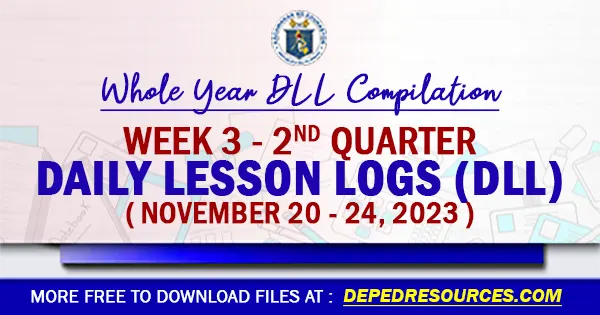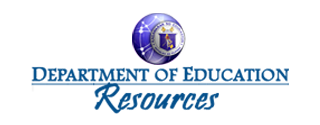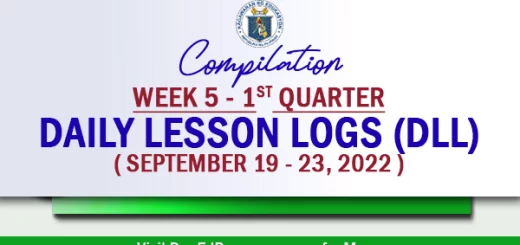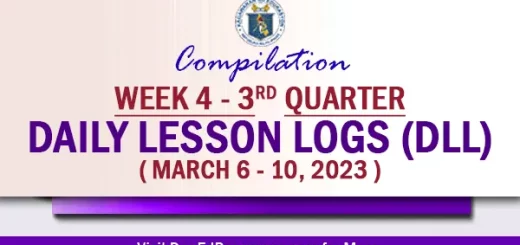Week 3 – 2nd Quarter Daily Lesson Log | November 20 – 24, 2023 DLLs
Greetings and welcome! To support teachers in creating a well-organized framework that does not only facilitates the delivery of content but also fosters student engagement while encouraging ongoing enhancement of instructional methods to elevate the overall quality of the teaching and learning experience, we are pleased to offer our ready-made Week 3 – 2nd Quarter Daily Lesson Log | November 20 – 24, 2023 DLLs that adhere with the latest Curriculum Guide for every grade level. Below, you’ll find the links to access the weekly K–12 Daily Lesson Logs for download.
Contents in Lesson Planning
Education should go beyond memorization of facts. It should involve understanding concepts through a logical and progressive approach tailored to students’ capacities and maturity levels. The education system revolves around the knowledge students need to grow personally and socially. What students need to learn often referred to as “contents,” is closely tied to educational goals. These goals reflect the real-world and cultural understanding that students must achieve and this interaction happens within the school environment. Traditionally, content has been seen as concepts, data and information. However, this view needs to expand to include procedures, virtues, attitudes and rules. In essence, content now encompasses a unified reality that includes procedures, virtues and attitudes.
The term “concept” refers to theories, principles and information primarily stored in memory, like facts and data. For example, memorizing the formula for the circumference of a circle is a fact. However, understanding the concept involves grasping the relationships between different concepts or more general principles. For instance, knowing that objects collide and exchange force is a fact, but understanding the concept of force helps explain why this happens. Concepts are not meant to be memorized but understood gradually often by connecting multiple concepts simultaneously.
While learning facts involves quantitative differences (knowing or not knowing the capital of the Philippines), learning concepts focuses on qualitative aspects. A primary education student and a physicist may both understand the concept of energy and force, but at different levels.
Analyzing the curriculum across educational stages reveals that primary education differs in how learning contents are distributed. Preschool education covers various subjects and discovery, while primary education organizes learning into knowledge areas. Secondary education then breaks down learning into specific subjects.
Simplifying content distribution and sequencing involves several key aspects:
- Student Maturity Development: Aligning content with students’ maturity levels.
- Logic Importance: Sequencing educational content logically for better comprehension.
- Gradual Development: Progressively and repetitively approaching contents, following a spiral curriculum.
- Continuity and Coherence: Ensuring a seamless flow and connection between contents.
- Adaptation to Students’ Capacities: Tailoring content to match students’ abilities.
- Balanced Treatment: Providing equal attention to different types of content.
- Connection of Disciplinary and Educational Contents: Clearly representing different learning fields in disciplinary content and recognizing the role of educational content in developing learning skills, abilities, and personal independence.

Week 3 – 2nd Quarter Daily Lesson Log |
November 20 – 24, 2023 DLLs
New! Kinder Daily Lesson Log – Quarter 2 – Week 3
New! Grade 1 Daily Lesson Log – Quarter 2 – Week 3
New! Grade 2 Daily Lesson Log – Quarter 2 – Week 3
New! Grade 3 Daily Lesson Log – Quarter 2 – Week 3
New! Grade 4 Daily Lesson Log – Quarter 2 – Week 3
New! Grade 5 Daily Lesson Log – Quarter 2 – Week 3
New! Grade 6 Daily Lesson Log – Quarter 2 – Week 3
Grades 7 to 12 still processing.
MORE FREE TO DOWNLOAD FILES HERE
Budget of Work | Bulletin Board Display | Curriculum Guide | Daily Lesson Log | DepEd Announcements | DepEd Memo | DepEd News | DepEd Official Statements | DepEd Order | DepEd Press Releases | Designs and Templates | Detailed Lesson Plan | Diagnostic Test | Download Files Here | Exams | Forms | Graduation | Instructional Materials | Latest News | Latest! | Learners Material | Periodical Tests | PowerPoint Presentations | Reviewers | RPMS | School Forms | Summative Test | Teachers Guide | Teachers Manuals | Teachers Tools | Weekly Daily Lesson Log | Workbooks
These daily lesson log were made in compliance with the Department of Education format.
DepEd Resources credits these files to all the owners and authors as well as those who sent us this files for posting. We will always be thankful of you. You make DepEd Resources possible for our beloved teachers .
Please LIKE and SHARE so everyone would benefit from these files. Thank you!
FOLLOW US on Facebook! Click Here.
“I cannot do all the good that the world needs. But the world needs all the good that I can do.”
― Jana Stanfield
 Learn about the information we collect and how it's used.
Learn about the information we collect and how it's used. Discover how we protect your data.
Discover how we protect your data. Understand your rights and choices regarding your personal information.
Understand your rights and choices regarding your personal information.














